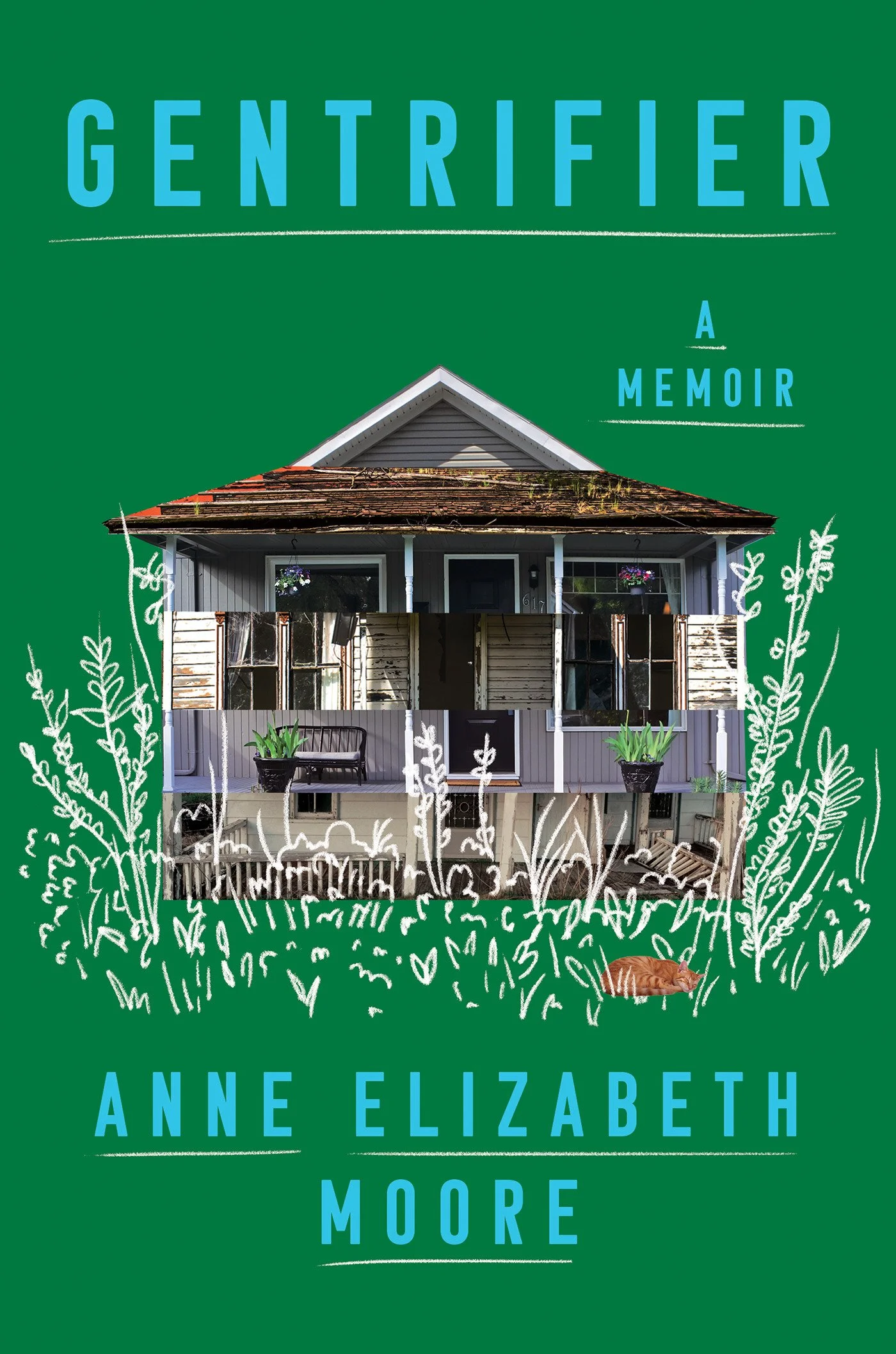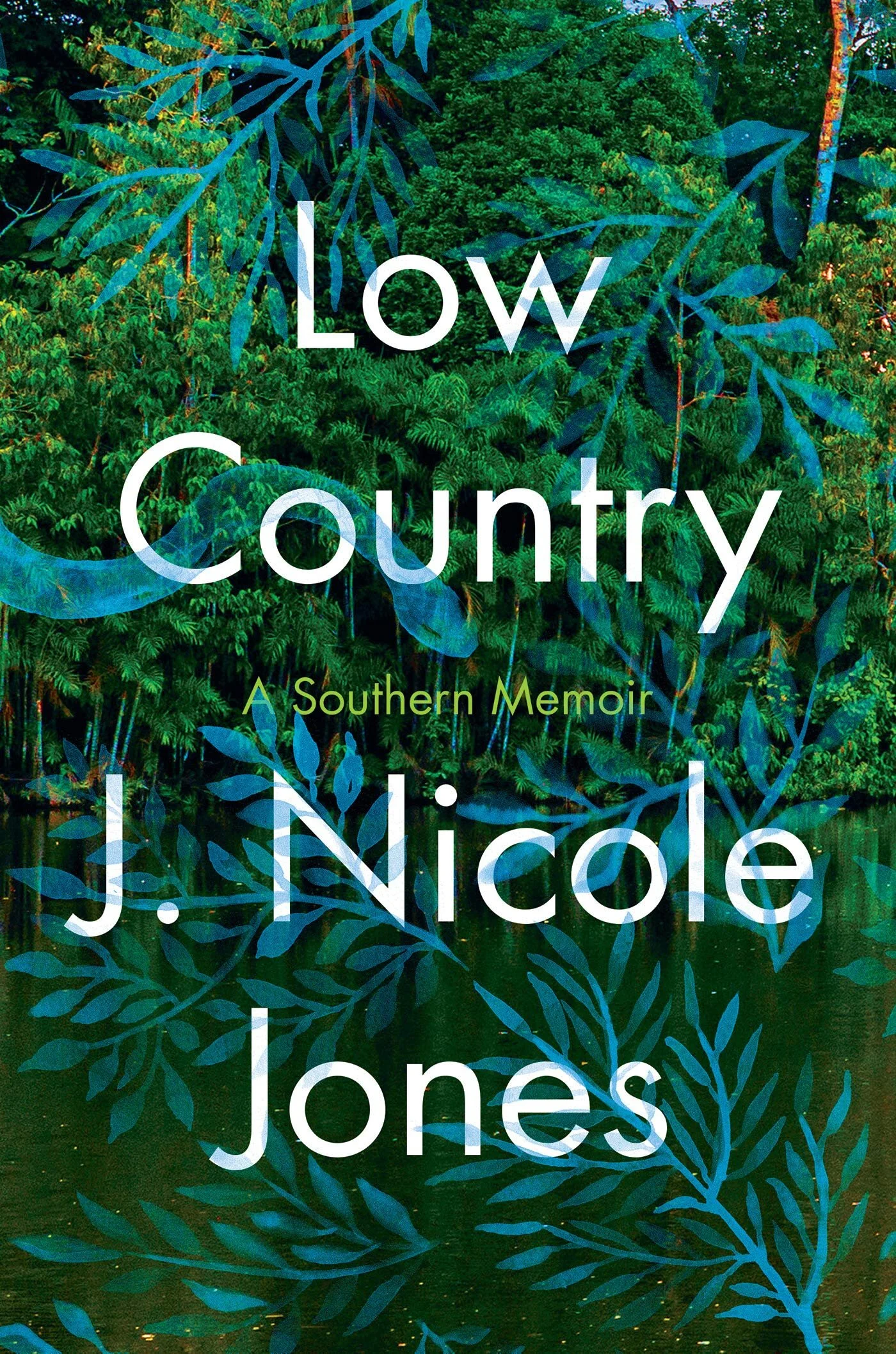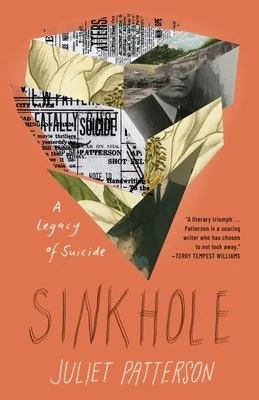Hot Off the Shelf: Gentrifier by Anne Elizabeth Moore
[image description: the book cover of Gentrifier: A Memoir by Anne Elizabeth Moore. The background is green with a house made of several photos of houses collaged together into one. The title is in blue lettering across the top.]
Disclaimer: I received a free copy of this book in exchange for an honest review and I honestly LOVED it! There’s an affiliate link at the end.
Every now and then you come across a book by an author who’s beyond brilliant yet is so confident about it that their prose reads easy and smooth, like a good vintage wine. That’s how it feels to read Anne Elizabeth Moore’s writing. She’ll blow your mind with her insights, but is so good with one-liners that her prose is concise––she never beats readers over the head.
I first became aware of her work when I read Body Horror a few years back. I’d never read––and still haven’t read––anything else like it. The book deftly weaves together essays on chronic illness, capitalism, and globalization together in a way that I still think about often. So I was already pretty confident going into her latest book, Gentrifier: A Memoir, that I was going to love it. And yet, it was even better than I expected.
Before I dive in further, (and fyi, this is a spoiler-free review) the synopsis:
Taking on the thorny ethics of owning and selling property as a white woman in a majority Black city and a majority Bangladeshi neighborhood with both intelligence and humor, this memoir brings a new perspective to a Detroit that finds itself perpetually on the brink of revitalization.
In 2016, a Detroit arts organization grants writer and artist Anne Elizabeth Moore a free house--a room of her own, à la Virginia Woolf--in Detroit's majority-Bangladeshi "Banglatown." Accompanied by her cats, Moore moves to the bungalow in her new city where she gardens, befriends the neighborhood youth, and grows to intimately understand civic collapse and community solidarity. When the troubled history of her prize house comes to light, Moore finds her life destabilized by the aftershocks of the housing crisis and governmental corruption.
This is also a memoir of art, gender, work, and survival. Moore writes into the gaps of Woolf's declaration that "a woman must have money and a room of one's own if she is to write"; what if this woman were queer and living with chronic illness, as Moore is, or a South Asian immigrant, like Moore's neighbors? And what if her primary coping mechanism was jokes?
Part investigation, part comedy of a vexing city, and part love letter to girlhood, Gentrifier examines capitalism, property ownership, and whiteness, asking if we can ever really win when violence and profit are inextricably linked with victory.
There’s a lot going on here and literal volumes have been written about each of the topics covered in the book, and yet AEM weaves them all together concisely. Within each chapter, the narrative is told in snippets––sometimes just a sentence or two and sometimes up to two pages. Most are a couple of paragraphs. They’re grouped more or less thematically, though the themes bleed seamlessly into one another, and the memoir isn’t linear. As I read, I imagined myself trying to write a book in this style and immediately feeling overwhelmed with how I would organize the hundreds of snippets into a cohesive, engaging narrative. This is to say that I appreciate the form and structure of the memoir as much as I appreciate the content.
Speaking of the memoir’s content, from one snippet to another I went from thinking, “oh, wow, what a vibrant community Detroit has; I bet it’s a nice place to live” and “WHAT THE FUCK, that’s no way to run a city!” I got the impression that those who thrive in Detroit have an inordinate amount of patience for bullshit and bureaucracy. Oscillating between these two feelings is jarring in an intentional, necessary way. It makes you appreciate how good the good is and understand how bad the bad is when you have both placed in such stark contrast.
Though she never calls them by name (probably for legal reasons), I’m familiar with the arts organization that gave AEM her free house (which wasn’t really free and wasn’t really theirs to give, but I’ll leave you to read about that fiasco). Now defunct, Write A House was all over the news when I was in college. The idea was that it would be a win-win for all involved for this nonprofit to buy Detroit’s cheap houses, fix them up, and give them to writers to live in for free as a way to draw more arts and culture to the city, as well as save its historic houses and fight blight. 21-year-old me thought this was perfect and eagerly looked into how to go about getting one of these free houses, not caring where it was or that one should probably look at such astonishing gifts with an eye trained toward skepticism. All I knew then was that I wanted one of the houses. I’d recently read Virginia Woolf and, not having any other plans upon graduation, desperately wanted a room of one’s own.
It’s for the best that I hadn’t yet done anything writing-wise that might have earned me a free house from Write A House, otherwise, I’d have known firsthand the calamity AEM experienced. None of the nightmares she experienced is her fault––she was drawn to Detroit under false pretenses by the arts organization. And no one could blame her for not looking the gift horse in the mouth. The writing and publishing industry is so full of doom and gloom that when a glimmer of hope shines through, you can’t help wanting to bask in that glittering light. I see why she was drawn in. Hell, a few years ahead in my career and I would’ve been too.
Sometimes I wonder if I’m too cynical, then I read something like this and think perhaps I’m not cynical enough. There are so many insidious forces in the world working to uphold corruption and the dark side of capitalism that it makes you wonder if the wicked web will ever be untangled––and if it can be untangled, who has the energy to do that work without burning out or otherwise suffering on behalf of the work? How much should one be expected to personally sacrifice on the altar of rectifying the mistakes of the past, mistakes that long predated that individual? Gentrifier: A Memoir grapples with these questions and so many more.
Before reading this, I thought I understood gentrification from an intellectual standpoint, but I didn’t know the half of it. Whenever most people talk about Detroit, they do it with a sense of melancholy laced with destruction porn/poverty porn. They lament how much has been lost in the city over the past couple of decades as if America’s deindustrialization is solely to blame. I’ve been guilty of this myself; I imagine we all have. What I didn’t understand until I read this memoir is that destruction is profitable. It’s lucrative for a bank to foreclose on a house and resell it. It’s easier and cheaper to demolish a house, salvaging it for materials first, than to wait around for payment of back taxes. Especially when Detroit’s property taxes are among the highest in the nation. Especially, especially when the demolition companies have a contract with the city and the price of demolition has doubled. This is government-sanctioned land theft and property theft, and the primary people who suffer at the city’s hands are people of color. And the occasional white person who’s given a free house in a neighborhood that’s predominantly people of color.
There most certainly have been books and articles written by BIPOC people about the housing crisis and government corruption in Detroit and I think AEM’s memoir is an important addition to that literature. I think unintentional gentrification is something on more and more white people’s minds right now, especially as housing costs are rising astronomically nearly everywhere in the wake of the pandemic. When my partner and I were house hunting years ago, in the time before Columbus’s population boom, it took us months to find a house in a neighborhood that hadn’t been gentrified. I honestly don’t know how anyone at our middle-class income level is doing it now.
Gentrifier gave me a lot to think about and I suspect I’ll be mulling over these questions for a long time. I’m definitely planning to re-read the memoir again in a couple of years. I think it’ll withstand the test of time because it’s compelling––drawing you in with what you want (fascinating stories about the experience of receiving a free house) yet giving you what you need (real talk about the complicated ethics of gentrification). I gave it 5 out of 5 stars on Goodreads and can’t recommend Gentrifier highly enough.
If you’d like a copy (and I hope you do!) you can support this blog by using my Bookshop link. It’s an Amazon alternative that supports indie bookstores, so win-win!






